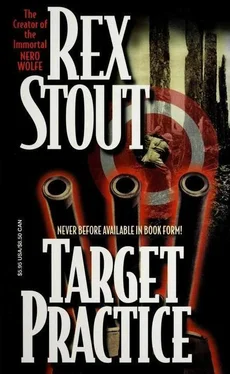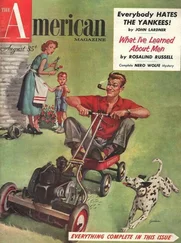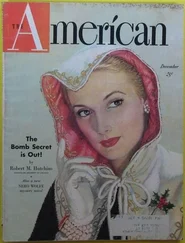Rex Stout - Target Practice
Здесь есть возможность читать онлайн «Rex Stout - Target Practice» весь текст электронной книги совершенно бесплатно (целиком полную версию без сокращений). В некоторых случаях можно слушать аудио, скачать через торрент в формате fb2 и присутствует краткое содержание. Город: New York, Год выпуска: 1997, ISBN: 1997, Издательство: Carroll & Graf, Жанр: short_story, Детектив, на английском языке. Описание произведения, (предисловие) а так же отзывы посетителей доступны на портале библиотеки ЛибКат.
- Название:Target Practice
- Автор:
- Издательство:Carroll & Graf
- Жанр:
- Год:1997
- Город:New York
- ISBN:978-0-7867-0496-5
- Рейтинг книги:5 / 5. Голосов: 1
-
Избранное:Добавить в избранное
- Отзывы:
-
Ваша оценка:
- 100
- 1
- 2
- 3
- 4
- 5
Target Practice: краткое содержание, описание и аннотация
Предлагаем к чтению аннотацию, описание, краткое содержание или предисловие (зависит от того, что написал сам автор книги «Target Practice»). Если вы не нашли необходимую информацию о книге — напишите в комментариях, мы постараемся отыскать её.
All-Story Magazine,
Target Practice — читать онлайн бесплатно полную книгу (весь текст) целиком
Ниже представлен текст книги, разбитый по страницам. Система сохранения места последней прочитанной страницы, позволяет с удобством читать онлайн бесплатно книгу «Target Practice», без необходимости каждый раз заново искать на чём Вы остановились. Поставьте закладку, и сможете в любой момент перейти на страницу, на которой закончили чтение.
Интервал:
Закладка:
“But how do you know when they’re ready to begin operations?”
“I don’t know — something — the way they hold their head — you can tell—”
That is, he could tell. I grew to regard him as infallible on any question concerning an animal in harness or under a saddle. One thing was certain: he loved his horses better than he did his hostlers, though he understood them equally well; and I am not ready to quarrel with the preference.
It was one July afternoon, when Dal and I were seated together out in front that the individual known as H. E. Gruber first appeared on the scene. That was the name he gave Dal. We marked him for a new face in the town the moment we saw him glide past us with a curious gait, half furtive, half insolent, in through the door of the runway to the livery stable. I replied to Dal’s inquiring glance:
“Never saw him before.”
In a minute the stranger emerged again from the stable, approached me and spoke:
“The boys sent me out here. You the boss?”
I designated Dal by a nod of the head, and the stranger turned to him with the information that he wished to hire a rig. I took advantage of the opportunity to look him over. He had a sly, hard face, with mean little colorless eyes that shifted vaguely as he talked; his voice had a curious way of changing suddenly from a puny softness to a grating, rasping snarl. He looked to be somewhere in the fifties, and was dressed well, in a gray sack suit and black derby.
“Where do you want to go?” Dal inquired with a frown. It was plain that he, too, was unfavorably impressed with the man’s appearance.
The stranger replied that he wished to drive out to John Hawkins’s farm; and finally, after taking his name and inquiring concerning the extent of his experience with horses, Dal called to one of the boys to tell him to get out a single buggy. While that was being done the stranger, Gruber, inquired the way to his destination, and Dal described the route with the greatest care. He was always particular about those things; not so much, I believe, to serve his customers, as on account of the fact that when a man loses his way he becomes angry and usually takes it out on the horse.
“It’s good road all the way,” said Dal, as the rig was led out and Gruber climbed in. “You ought to make it in an hour. If you’re kept over suppertime John’ll look after the horse. John Hawkins always feeds his animals before he does himself.”
The stranger nodded, shook the reins and was off, with Nanny, one of me best mares in town, breaking into a smart trot the moment she hit the road.
Dal and I puffed for a couple of minutes in silence. The buggy had disappeared down the street when I took my cigar from my mourn to observe speculatively:
“Queer specimen.”
Dal nodded. “Yes. Can’t quite figure him out. Drummer? No. Looks like a backdoor politician. Probably from Denver. What the dickens does he want with old John Hawkins?”
The same query was in my own mind, for two men more totally different man the stranger Gruber and the farmer he was going to see would have been hard to find. John Hawkins had come to our part of the country some five years before, from where nobody knew, and bought the old Miller farm, paying all but a thousand dollars in cash. That last is a bit of inside information, for I was the lawyer who drew up the deed.
People laughed at him while they pitied him, for the Miller farm was the most notoriously bad quarter section in the township. But Hawkins soon showed them that if he possessed no knowledge of farmland and farming he at least knew how to work and learn. He found a book somewhere on fertilizers, and the second year he got a fair crop of corn on his west forty, though he nearly starved doing it. The third year was better still, and he began then to make money from his poultry, too. People learned to respect and admire him, all the more because he had earned the reputation of being the hardest worker in the country; and yet he couldn’t have been a day less than fifty-five, with his medium-sized stooping figure, gray hair, and furrowed, careworn countenance. He was a silent, reserved man, with a look of grim submission in his steady brown eyes that at times startled you with its pathos.
A certain portion of the community was particularly interested in his poultry; and you will understand what that portion was when you learn that the poultry was under the special care of Hawkins’s daughter. Her name was Janet. The best possible advertisement for the purposes of the “back to the farm” propagandists would be a card containing photographs, after the fashion of patent medicine ads, of Janet Hawkins “before” and “after.” When she first appeared — I remember seeing her walk down Main Street with her father the day they arrived — she was a dark, shrinking little thing with muddy cheeks and dull, stony eyes that refused to look at anybody. Seeing her from a little distance you would have thought her an underfed twelve-year-old; close up she looked nearer twice that age. Really she was then just nineteen.
In a year she was a totally different creature. My enthusiasm makes me fear the attempt to describe her, for I myself have not reached the age of senility and for three years I held certain hopes with regard to Janet Hawkins which finally proved vain. Though the change in her appearance was startling and complete, it took place so gradually that it would be hard to say when it began or what it consisted of. Her complexion became all milk and roses, her eyes alive with the fire and happiness of youth, her figure supple and incredibly quick and graceful in movement; but there was something deeper than any of these, a rebirth of her spirit that made her laughter thrill you from head to foot and her glance pierce you with joy. She was wonderful. I know.
It was not long, of course, before she was the object of a mad pursuit; as pretty a race as you would care to see. Two or three young farmers were the first entries, besides old Jerry Pratt, who owns some fifteen hundred acres in the southern part of the county; soon they were joined, one by one, by a dozen of us from the town. Dal Willett was among the number; during one whole summer he drove out to the Hawkins farm every evening, but he spent little time with Janet. He was too reserved in the matter; the others rushed him off his feet, and I believe he never really entertained any hope. He used to sit out on the back porch with old Hawkins, talking horses and crops, and in that way the two men became intimate. About nine o’clock Janet would come out with a pitcher of lemonade, having first served those in front — there was always somebody — and a little later we would all leave together. Many a time I’ve seen two or three buggies and as many automobiles file out one after another through the Hawkins gate.
When we learned that Walter Rogers had entered the race the rest of us were about ready to give up. Rogers, a man about thirty, was president of the local bank and by far the wealthiest citizen of the country. He was a good, hard-working fellow, too, and well liked. Most of us admitted bitterly that he was just the man for Janet Hawkins, and feeling that our chances were gone we soon capitulated. We should have known that Janet was not the kind of girl to be attracted by an eight-cylinder motor and three servants; but at that we were right in a way. Our chances were gone.
Late in September she was married to Roy Nelson, a struggling young farmer who lived five miles away and who had walked that distance and home again twice a week to see her, because he had been working his horses all day and thought they needed rest more than he did.
So Janet became Mrs. Nelson, and at the end of autumn her husband sold out his small interest in his forty acres and the newly married couple came to live with old man Hawkins. Nelson soon proved that Janet had made no mistake. During the following two years he nearly doubled the crops, and yet found time to make his wife happy. I got to know him pretty well, and discovered that he was an admirable fellow in every way. He worshiped Janet, and she thought him perfect. It was a mighty happy family. Nelson wouldn’t let John Hawkins do anything except look after the poultry, but the old man did that with such success that at the end of the second year he had a profit of four figures and half a dozen blue ribbons to show for it. I remember the naive pride with which he showed me his photograph one day, published in the Utah Poultry Bulletin.
Читать дальшеИнтервал:
Закладка:
Похожие книги на «Target Practice»
Представляем Вашему вниманию похожие книги на «Target Practice» списком для выбора. Мы отобрали схожую по названию и смыслу литературу в надежде предоставить читателям больше вариантов отыскать новые, интересные, ещё непрочитанные произведения.
Обсуждение, отзывы о книге «Target Practice» и просто собственные мнения читателей. Оставьте ваши комментарии, напишите, что Вы думаете о произведении, его смысле или главных героях. Укажите что конкретно понравилось, а что нет, и почему Вы так считаете.












